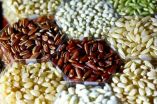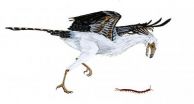(Press-News.org) For the first time in roughly 2 million years, melting Arctic sea ice is connecting the north Pacific and north Atlantic oceans. The newly opened passages leave both coasts and Arctic waters vulnerable to a large wave of invasive species, biologists from the Smithsonian Environmental Research Center assert in a commentary published May 28 in Nature Climate Change.
Two new shipping routes have opened in the Arctic: the Northwest Passage through Canada, and the Northern Sea Route, a 3000-mile stretch along the coasts of Russia and Norway connecting the Barents and Bering seas. While new opportunities for tapping Arctic natural resources and interoceanic trade are high, commercial ships often inadvertently carry invasive species. Organisms from previous ports can cling to the undersides of their hulls or be pumped in the enormous tanks of ballast water inside their hulls. Now that climate change has given ships a new, shorter way to cross between oceans, the risks of new invasions are escalating.
"Trans-Arctic shipping is a game changer that will play out on a global scale," said lead author Whitman Miller. "The economic draw of the Arctic is enormous. Whether it's greater access to the region's rich natural resource reserves or cheaper and faster inter-ocean commercial trade, Arctic shipping will reshape world markets. If unchecked, these activities will vastly alter the exchange of invasive species, especially across the Arctic, north Atlantic and north Pacific oceans."
The first commercial voyage through the Northwest Passage—a carrier from British Columbia loaded with coal bound for Finland—occurred in September 2013. Meanwhile, traffic through the Northern Sea Route has been rising rapidly since 2009. The scientists project that at the current rate, it could continue to rise 20 percent every year for the next quarter century, and this does not take into account ships sailing to the Arctic itself.
For the past 100-plus years, shipping between oceans passed through the Panama or Suez Canals. Both contain warm, tropical water, likely to kill or severely weaken potential invaders from colder regions. In the Panama Canal, species on the hulls of ships also had to cope with a sharp change in salinity, from marine to completely fresh water. The Arctic passages contain only cold, marine water. As long as species are able to endure cold temperatures, their odds of surviving an Arctic voyage are good. That, combined with the shorter length of the voyages, means many more species are likely to remain alive throughout the journey.
Though the routes pose major risks to the north Atlantic and north Pacific coasts, the Arctic is also becoming an attractive destination. Tourism is growing, and it contains vast stores of natural resources. The Arctic holds an estimated 13 percent of the world's untapped oil and 30 percent of its natural gas. Greenland's supply of rare earth metals is estimated to be able to fill 20 to 25 percent of global demand for the near future. Until now the Arctic has been largely isolated from intensive shipping, shoreline development and human-induced invasions, but the scientists said that is likely to change drastically in the decades to come.
"The good news is that the Arctic ecosystem is still relatively intact and has had low exposure to invasions until now," said coauthor Greg Ruiz. "This novel corridor is only just opening. Now is the time to advance effective management options that prevent a boom in invasions and minimize their ecological, economic and health impacts."
INFORMATION:
For a full copy of the paper, images or to speak with the authors, contact Kristen Minogue at minoguek@si.edu or 443-482-2325.
Melting Arctic opens new passages for invasive species
Scientists say early action could protect coasts
2014-05-28
ELSE PRESS RELEASES FROM THIS DATE:
3,000 rice genome sequences made publicly available on World Hunger Day
2014-05-28
The open-access, open-data journal GigaScience (published by BGI and Biomed Central), announces today the publication of an article on the genome sequencing of 3000 rice strains along with the release of this entire dataset in a citable format in journal's affiliated open-access database, GigaDB. The publication and release of this enormous data set (which quadruples the current amount of publicly available rice sequence data) coincides with World Hunger Day to highlight one of the primary goals of this project— to develop resources that will aid in improving global food ...
High-status co-eds use 'slut discourse' to assert class advantage
2014-05-28
WASHINGTON, DC, May 27, 2014 — A new study suggests that high-status female college students employ "slut discourse" — defining their styles of femininity and approaches to sexuality as classy rather than trashy or slutty — to assert class advantage and put themselves in a position where they can enjoy sexual exploration with few social consequences.
"Viewing women only as victims of men's sexual dominance fails to hold women accountable for the roles they play in reproducing social inequalities," said lead author Elizabeth A. Armstrong, an associate professor of sociology ...
Prehistoric birds lacked in diversity
2014-05-28
Birds come in astounding variety—from hummingbirds to emus—and behave in myriad ways: they soar the skies, swim the waters, and forage the forests. But this wasn't always the case, according to research by scientists at the University of Chicago and the Field Museum.
The researchers found a striking lack of diversity in the earliest known fossil bird fauna (a set of species that lived at about the same time and in the same habitat). "There were no swans, no swallows, no herons, nothing like that. They were pretty much all between a sparrow and a crow," said Jonathan ...
Cod bones reveal 13th century origin of global fish trade
2014-05-28
London's international fish trade can be traced back 800 years to the medieval period, according to new research published today in the journal Antiquity.
The research, led by archaeologists from UCL, Cambridge and UCLan, provides new insight into the medieval fish trade and the globalisation of London's food supply.
Archaeologists analysed data from nearly 3,000 cod bones found in 95 different excavations in and around London. They identified a sudden change in the origin of the fish during the early 13th century, indicating the onset of a large-scale import trade.
Lead ...
Butterfly 'eyespots' add detail to the story of evolution
2014-05-28
CORVALLIS, Ore. – A new study of the colorful "eyespots" on the wings of some butterfly species is helping to address fundamental questions about evolution that are conceptually similar to the quandary Aristotle wrestled with about 330 B.C. – "which came first, the chicken or the egg?"
After consideration, Aristotle decided that both the egg and the chicken had always existed. That was not the right answer. The new Oregon State University research is providing a little more detail.
The study, published today in Proceedings of the Royal Society B, actually attempts to ...
Should sugary drinks carry a health warning?
2014-05-28
In a personal view published on bmj.com today, a professor of public health at a leading university thinks there should be health warning labels on sugary drinks.
Professor Simon Capewell, professor at the University of Liverpool, highlights that the State of California is considering a new health bill. One which will see sugary drinks labelled with health warnings, vending machines to bear warning labels, and fines of between $50 and $500 per failed inspection".
Professor Capewell thinks this is a good idea, and one that the UK public would support.
He says that ...
Higher NHS spending in deprived areas can reduce health inequalities
2014-05-28
A policy of higher NHS spending in deprived areas compared with affluent areas is associated with a reduction in absolute health inequalities from causes amenable to healthcare in England, suggests a study published on bmj.com today.
In 1999, the government introduced a new 'health inequalities' objective for the allocation of NHS resources in England, which resulted in greater NHS spending in deprived areas with the worst health outcomes. But it is not known whether this policy was successful in contributing to a reduction in health inequalities.
So researchers based ...
School scheme unable to boost healthy eating and activity among kids
2014-05-28
A school-based scheme to encourage children to eat healthily and be active has had little effect, conclude researchers in a study published on bmj.com today.
The findings have relevance for researchers, policy makers, public health practitioners, and doctors, and they suggest that more intense interventions may be required.
Low levels of physical activity and of fruit and vegetable consumption in childhood are associated with adverse health outcomes. School based interventions have the potential to reach the vast majority of children, and evidence reviews have suggested ...
Barriers to HIV testing in older children
2014-05-28
Concerns about guardianship and privacy can discourage clinics from testing children for HIV, according to new research from Zimbabwe published this week in PLOS Medicine. The results of the study, by Rashida A. Ferrand of the London School of Hygiene & Tropical Medicine and colleagues, provide much-needed information on how to improve care of this vulnerable population.
More than three million children globally are living with HIV (90% in sub-Saharan Africa) and in 2011 an estimated 1000 infant infections occurred every day. HIV acquired through mother-to-child transmission ...
Making research findings freely available is an essential aid to medical progress
2014-05-28
In a PLOS Medicine guest editorial, Paul Glasziou, Professor of Evidence-Based Medicine at Bond University in Australia, explores how open access publications could help moderate and reduce the vast waste of global medical research.
Continuing on from his previous work, which highlighted how most of the world's expenditure on medical research was thrown away, Glasziou outlines how bad the situation is and suggests how it might be improved. Subscription-based academic journals make money by through copyrights assigned by authors to publishers who lock the articles behind ...
LAST 30 PRESS RELEASES:
Barshop Institute to receive up to $38 million from ARPA-H, anchoring UT San Antonio as a national leader in aging and healthy longevity science
Anion-cation synergistic additives solve the "performance triangle" problem in zinc-iodine batteries
Ancient diets reveal surprising survival strategies in prehistoric Poland
Pre-pregnancy parental overweight/obesity linked to next generation’s heightened fatty liver disease risk
Obstructive sleep apnoea may cost UK + US economies billions in lost productivity
Guidelines set new playbook for pediatric clinical trial reporting
Adolescent cannabis use may follow the same pattern as alcohol use
Lifespan-extending treatments increase variation in age at time of death
From ancient myths to ‘Indo-manga’: Artists in the Global South are reframing the comic
Putting some ‘muscle’ into material design
House fires release harmful compounds into the air
Novel structural insights into Phytophthora effectors challenge long-held assumptions in plant pathology
Q&A: Researchers discuss potential solutions for the feedback loop affecting scientific publishing
A new ecological model highlights how fluctuating environments push microbes to work together
Chapman University researcher warns of structural risks at Grand Renaissance Dam putting property and lives in danger
Courtship is complicated, even in fruit flies
Columbia announces ARPA-H contract to advance science of healthy aging
New NYUAD study reveals hidden stress facing coral reef fish in the Arabian Gulf
36 months later: Distance learning in the wake of COVID-19
Blaming beavers for flood damage is bad policy and bad science, Concordia research shows
The new ‘forever’ contaminant? SFU study raises alarm on marine fiberglass pollution
Shorter early-life telomere length as a predictor of survival
Why do female caribou have antlers?
How studying yeast in the gut could lead to new, better drugs
Chemists thought phosphorus had shown all its cards. It surprised them with a new move
A feedback loop of rising submissions and overburdened peer reviewers threatens the peer review system of the scientific literature
Rediscovered music may never sound the same twice, according to new Surrey study
Ochsner Baton Rouge expands specialty physicians and providers at area clinics and O’Neal hospital
New strategies aim at HIV’s last strongholds
Ambitious climate policy ensures reduction of CO2 emissions
[Press-News.org] Melting Arctic opens new passages for invasive speciesScientists say early action could protect coasts


